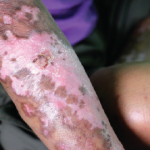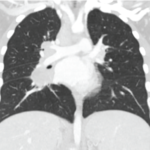In 2014, the American College of Rheumatology (ACR) was one of 25 healthcare associations invited to participate in an initiative by the American Medical Association (AMA) to reduce the public health epidemic posed by the abuse of prescription opioids.1 The AMA initiative is based on the belief that physicians are professionally obligated to participate in…
The ACR/CHEST ILD Guidelines in Practice, a video
In collaboration with the American College of Chest Physicians, the ACR released two new comprehensive guidelines aimed at improving the screening, monitoring, and treatment of patients with interstitial lung disease (ILD) secondary to systemic autoimmune rheumatic diseases (SARDs). Recently, Sindhu R. Johnson, MD, PhD, professor of medicine at the University of Toronto, Canada, director of the Toronto Scleroderma Program and principal investigator for the guideline, and Elana J. Bernstein, MD, MSc, Florence Irving associate professor of medicine in the Division of Rheumatology at Columbia University, New York City, and co-first author, presented a webinar to talk about how the guidelines were developed and present some of the recommendations and their rationale: Watch the recording now!

The Fight Against the Medicare Part B Demonstration Project
The ACR and 315 other organizations have publicly said savings would not be achieved by the demonstration project and that it will reduce access to care for patients…
15 Years of Clinician Educators & Scholars in Rheumatology
Since 1999, 60 rheumatologists have received the Clinician Scholar Educator Award from the Rheumatology Research Foundation. These clinician educators have benefitted professionally from the award and have also dedicated themselves to the advancement of education. Most spend at least 30% of their time engaged in education, and awardees provide curriculum widely used in rheumatology fellowship programs…
Benchmark 2017 Healthcare.gov Premiums Up 25%
(Reuters)—The average premium for benchmark 2017 Obamacare insurance plans sold on Healthcare.gov rose 25% compared with 2016, according to the U.S. government on Monday, the biggest increase since the insurance first went on sale in 2013 for the following year. The average monthly premium for the benchmark plan is rising to $302 from $242 in…
Cigna Ends Preauthorization Requirement to Treat Opioid Addiction
(Reuters)—Health insurer Cigna Corp. has discontinued its policy of requiring doctors to seek authorization before treating opioid addicts, as part of a fight against an epidemic of opioid abuse, New York Attorney General Eric Schneiderman said on Friday. The policy change will apply nationally, says Schneiderman, who has been pushing for easier access to treatments…

Mechanistic, Epidemiologic Clues Suggest Possible Link Between Obesity, Inflammation in Rheumatoid Arthritis
Obesity has an established systemic inflammatory component. Could that be a trigger for the inflammation seen in rheumatoid arthritis (RA) and other rheumatic diseases? Although there is no direct scientific evidence, both mechanistic and epidemiologic clues do give some intriguing suggestions of a possible link. “At first, we thought that fat was involved only in…

Rheumatoid Arthritis Research Provides New Insights on Risk Factors, Identification Tools, Intervention
Established wisdom holds that patients with rheumatoid arthritis (RA) will fare better if their disease is diagnosed as early as possible, and treatments with disease-modifying drugs are started before inflammation can do more damage to joints and tissue. Usually, early diagnosis means spotting the clinical signs of disease, but new research tells us more about…

Targeted Therapy for Scleroderma Fibrosis
Scleroderma, or systemic sclerosis (SSc), is an autoimmune disease characterized by vasculopathy and fibrosis. Although relatively rare, with a prevalence in North America of approximately 300 per 1 million people, SSc is associated with significant morbidity and high rates of mortality.1 Patients with scleroderma have four times greater mortality than age- and sex-matched controls, with…

NYU Langone’s Division of Rheumatology in Manhattan Advances Its Mission to Understand Rheumatic Diseases, Improve Patient Outcomes
From its beginnings as the Rheumatic Diseases Study Group (RDSG) in the early 1930s, NYU Langone Medical Center’s Division of Rheumatology has been built on a tradition of research and clinical care. Today’s division, with 24 full-time and 76 part-time faculty members, continues to push toward understanding the pathogenesis of rheumatic diseases and interventions to…

New Large-Vessel Vasculitis Therapies Emerge, but Better Options Still Needed
LONDON—New therapies are emerging for the two main forms of large-vessel vasculitis, giant cell arteritis (GCA) and Takayasu’s arteritis—particularly biologic therapies. But for just about every available treatment gap, drawbacks or limited evidence remain, with the results needing to be borne out in larger trials, an expert said at the Annual Congress of the European…
- « Previous Page
- 1
- …
- 137
- 138
- 139
- 140
- 141
- …
- 251
- Next Page »
